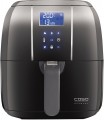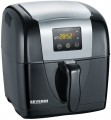Number of programs
The total number of cooking programs provided in the device.
The more this number — the more extensive the possibilities, the wider the choice of the user. However, note that a specific set of modes may be different, this point in each case should be clarified separately. See "Programmes" for details on specific modes.
Programmes
Cooking programs provided in the device. The most common cooking programs are:
fries,
chips,
chicken,
meat,
shrimps,
fish,
pizza,
vegetables.
— Fries. The fryer offers a specialized automatic cooking program designed specifically for preparing dishes like crispy potatoes, mushrooms, or meat in batter. While these dishes can be cooked in any deep fryer, this program simplifies the process. With this program, users no longer need to manually monitor the cooking time and temperature. They simply load the ingredients, select the appropriate mode, start the cooking process, and wait for it to complete. In multi-ovens and air fryers, this type of cooking can be achieved with minimal amounts of oil or even without oil at all, providing healthier cooking options.
— Chips. The fryer offers a dedicated cooking program specifically designed for making potato chips, which are thin and crispy slices of potato. While chips can be cooked in any deep fryer, if the device does not have a built-in cooking program, users will need to manually configure the cooking parameters and closely monitor the process. Alternatively, the option to cook chips may also be available in multi-ovens and convection ovens (
...see "Type"), expanding the cooking possibilities beyond traditional deep fryers.
— Chicken. A cooking program specifically designed for cooking chicken meat is commonly available in multi-ovens and air fryers. This program typically involves baking the chicken. However, deep fryers are less commonly equipped with this specific program. In deep fryers, the emphasis is usually on frying chicken with batter or without it.
— Meat. Program for cooking meat (veal, pork, etc.). It is used mainly in multi-ovens and air fryers, which means roasting meat.
— Shrimps. A cooking program specifically designed for cooking shrimps is commonly available in deep fryers, which typically allow frying shrimp in tempura batter. Air fryers and multi-ovens, on the other hand, may offer different cooking options for shrimps, such as boiling, particularly in the case of multi-ovens.
— Fish. Programme for cooking fish. In deep fryers (see "Type") fish is most often cooked in batter, in small pieces; it is possible to bake the whole fish, if the volume of the working space allows it in multi-ovens and air fryers.
— Pizza. A programme optimized for pizza making. The "Pizza" program, commonly found in multi-ovens, ensures that Italian dishes, as well as casseroles and pies, are cooked evenly on all sides. This program is designed to create a crispy crust on the top while maintaining a juicy filling inside.
— Vegetables. The "Vegetables" program, commonly available in multi-ovens, is characterized by its moderate temperature setting. It allows for slow and gentle heating of vegetables, similar to stewing. This program is ideal for preparing various vegetable-based dishes such as side dishes, stews, complex dishes and soup dressings.
— Auto-cooking. In addition to those described above, the design may also provide for other types of auto-cooking programs — for example, for mushrooms, barbecue, baking bread, etc.cooking t
The cooking temperature provided by the device. Most models are adjustable, so this item indicates the operating temperature range.
Deep frying is carried out at temperatures from 130 to
190 °С200 °С. But
high operating temperatures (over 200°) are less common.
Basket capacity
The capacity of the deep fryer basket or multi-oven bowl, or air fryer flask (see "Type") in kilograms is the maximum amount of food that can be loaded into the device at one time.
For deep fryers used in everyday life, a capacity of up to 0.6 – 0.8 kg is considered quite sufficient; it is rarely useful to fry numerous foods at a time at home. But models that can hold from a kilogram or more are designed mainly for industrial use — in cafes, canteens, etc. In turn, multi-ovens with a capacity of up to 0.8 kg can be called small, up to 1.5 kg — medium, more than 1.5 kg — large. Air fryers have approximately the same capacity.
Volume
The volume of the multi-cooker bowl, deep fryer basket, air fryer container, or the cooking chamber of a multi-oven.
This parameter is measured in liters and is directly related to the capacity of the basket (see above) — larger volumes are required for a greater quantity of food. For deep fryers (see "Type"), this parameter is usually specified not by the total volume but by the amount of oil needed for standard operation, providing an estimate of how much oil is required for the appliance. In models with separate compartments (see below), the volume may be indicated for each section individually.
Features
—
Temperature maintaining. The function is designed to maintain the temperature of a cooked dish, preventing it from cooling down. This feature is particularly useful when there is a significant time gap between cooking and serving, and it is desirable to keep the food warm.
—
Removable bowl. The presence of a removable bowl in the design of the appliance offers significant convenience for maintenance and cleaning purposes. It allows for easy removal of the bowl, simplifying tasks such as draining oil or washing. It is worth noting that the majority of multi-ovens and air fryers (see "Type") where the cover is removable instead. However, in the case of deep fryers, not all models incorporate this feature.
—
Viewing window. An added convenience in some appliances is the inclusion of a transparent window on the cover, which enables users to observe the cooking process without needing to open the cover. This feature is particularly useful for deep fryers as opening the cover during cooking can result in oil splattering. By having a window, users can safely monitor the process. It's worth noting that multi-ovens may also be equipped with a window, depending on the specific type of appliance.
—
Anti-odor filter. One notable feature is the presence of an anti-odor filter in the appliance, which helps purify the air tha
...t is emitted during the cooking process, effectively reducing strong odors. However, it is important to keep in mind that these filters typically have a finite lifespan and will require regular cleaning or replacement after a certain period of time.
— Heating indicator. The appliance has a temperature indicator that signals when it has reached the desired operating temperature. It is worth mentioning that in many models, this indicator also functions during the heating process, alerting users that the device is powered on and may have already reached high temperatures.
— Non-stick coating. The appliance is equipped with a special non-stick coating on the bowl, which prevents food from burning and sticking to the walls. This feature not only makes cleaning the bowl easier but also reduces the need for extensive cleaning. It's important to note that non-stick coatings are delicate and require gentle handling, avoiding the use of metal objects or abrasive cleaning products. However, due to the effectiveness of the coating, such rigorous cleaning is usually not necessary.
— Making fondue. Fondue is a dish consumed in a specific way: small pieces of bread, vegetables, mushrooms, etc. are dipped into the melted cheese on long forks. The ability to prepare such a dish is exclusively found in deep fryers (see "Type"): for this, the lid is removed, and the heater constantly operates in the "slow fire" mode, maintaining the desired consistency of the cheese. There are also other types of fondue, such as meat and chocolate variations; the possibility of preparing them should be checked separately.
— Delay start timer. A delay start feature is incorporated into the appliance, enabling users to schedule the cooking process for a specific time. This allows for pre-loading the food into the device and setting the desired program start time according to one's preference. For instance, it can be set to begin half an hour before returning from work, ensuring a freshly prepared, hot dish upon arrival home.
— Self-cleaning. The appliance includes a self-cleaning mode, which simplifies the cleaning process compared to manually washing a dirty container in the sink. Typically, this mode involves adding a small amount of water and detergent to the container and activating the designated self-cleaning program. Once completed, the water can be emptied, and the container can be wiped clean. It's worth noting that air fryers with mechanical controls may not have a dedicated button for the self-cleaning mode. Instead, the specific parameters such as temperature and duration are provided in the instruction.
— Child lock. In this case, it means the ability to lock the control panel — so a curious little child could not turn on the device or change the set operating settings. At the same time, for an adult, unlocking is not a problem.
— Auto power off. The main components of the air fryer, including the heater and fan, are located within the cover. Therefore, it is crucial to avoid turning on the appliance when the cover is outside the bowl or left open, as it can be dangerous and result in burns, damage to objects, or even fire. To ensure safety, modern air grills are equipped with an automatic system that disables the heating and convection functions when the cover is opened. This automation is typically implemented through a switch located beneath the foldable handle. When the handle is lifted to remove the bowl, the switch is released, interrupting the circuit. While theoretically, the cover can be removed without lifting the handle, it is often impractical or even impossible to do so. Overall, the switches located under the handle are designed to be reliable and contribute to the safe operation of the air fryer.Power consumption
The power consumed by the device during operation. Usually indicated by the maximum energy consumption, at the most intensive mode of operation.
Large capacity requires more power. However, devices with similar characteristics may differ in this parameter. It is worth noting that, other things being equal, lower power does not mean more economical energy consumption: cooking in such a device takes more time and as a result, the amount of energy spent is almost the same. At the same time, lower power means less load on the electrical grid, which can be important in houses with poor wiring.

